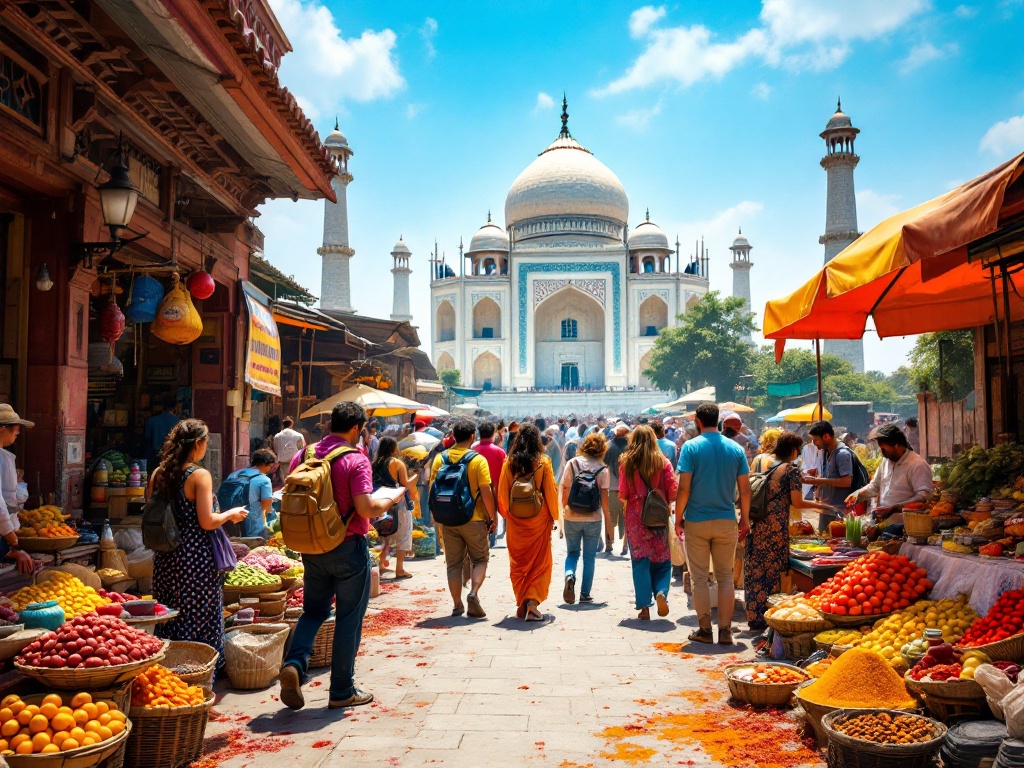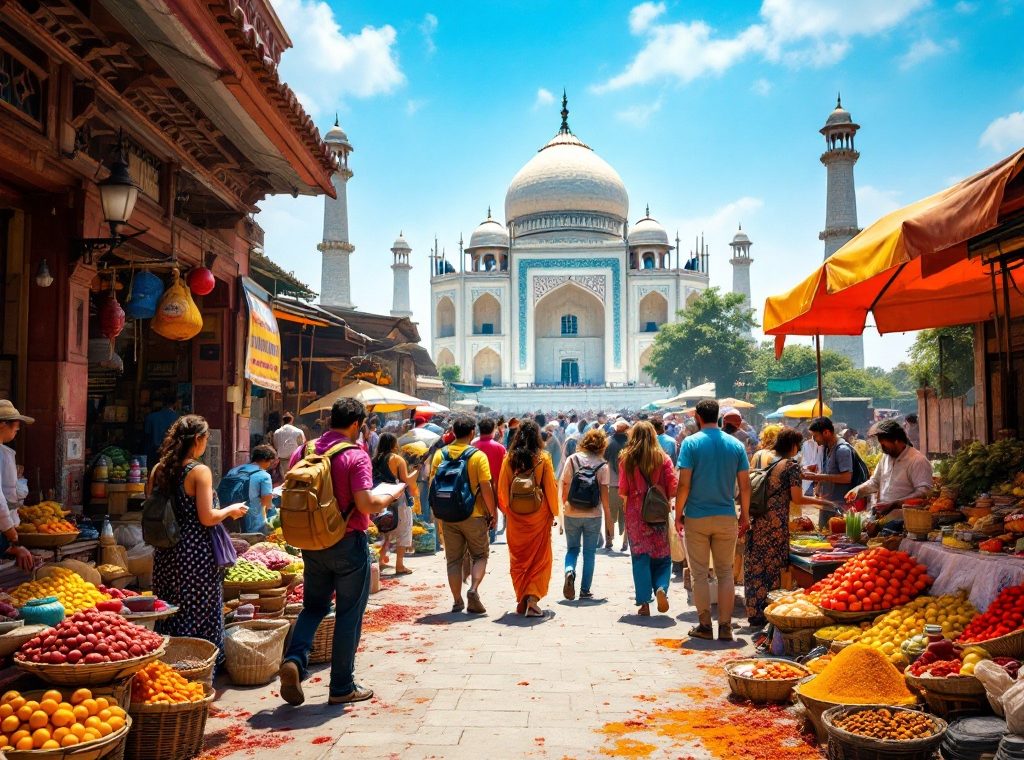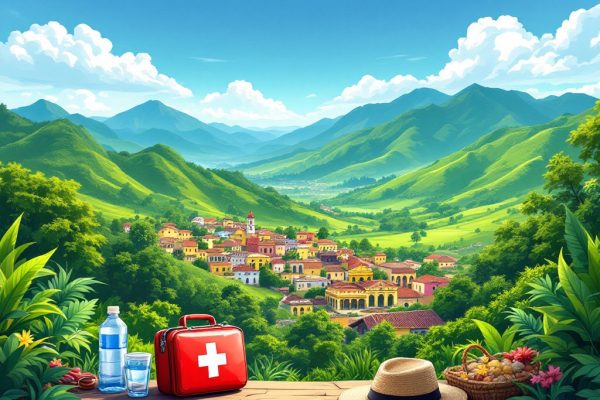Vaccinations and Health Recommendations while Traveling to India
Dreaming of an Indian adventure? Prepare for a safe and healthy trip by learning about recommended vaccinations like Hepatitis A & B and Typhoid. Discover essential food and water safety tips to prevent illness. Explore valuable resources, including pre-travel checklists and medical advice, to ensure a worry-free journey. Start planning your incredible Indian experience today!
Important information

- Consult your doctor 4-6 weeks before traveling to India to discuss recommended vaccinations (Hepatitis A & B, Typhoid, Tetanus-Diphtheria, MMR) and any additional ones based on your itinerary (e.g., Japanese Encephalitis and Rabies for rural or extended trips).
- Practice safe food and water habits: Drink bottled or boiled water, avoid ice, and eat thoroughly cooked meals. Peel fruits and vegetables yourself.
- Protect yourself from mosquitoes: Use insect repellent (DEET or picaridin), wear long sleeves and pants, sleep under mosquito nets, and limit outdoor activity during dawn and dusk.
- Obtain comprehensive travel insurance, including medical evacuation coverage, for emergencies and access to quality healthcare.
- Pack a well-stocked first-aid kit with essential medications, prescriptions, insect repellent, and hand sanitizer.
Vaccinations and Health Recommendations for Traveling to India
Before your trip to India, consult your doctor about necessary vaccinations and health precautions. Ensure your routine immunizations like MMR (measles, mumps, and rubella) are current. Hepatitis A and B vaccinations are generally advised, along with Typhoid and Tetanus-Diphtheria. Depending on your travel plans, additional vaccinations might be required.
If you plan to visit certain areas, have a longer stay, or participate in outdoor activities, consider the Japanese Encephalitis and Rabies vaccines.
Travel insurance is essential, especially with coverage for medical evacuation.
Pack a complete first-aid kit with personal medications, insect repellent, and hand sanitizer.
Safe food and water practices are crucial. Drink bottled or boiled water and eat well-cooked meals to prevent stomach problems.
With the right preparation, you can relax and enjoy your Indian adventure.
Essential Vaccines for Travel to India
Planning a trip to India? Consult your doctor 4–6 weeks before departure to ensure sufficient time for the necessary vaccinations. Several essential vaccines are recommended:
- hepatitis A and B,
- typhoid,
- tetanus-diphtheria.
These offer protection against common illnesses. For rural travel or extended stays, additional precautions such as Japanese Encephalitis and Rabies vaccines are advisable. This is vital for your health and safety.
Routine Vaccinations to Update Before Traveling
Planning a trip to India? Ensure your routine vaccinations are current, including MMR (measles, mumps, and rubella) and tetanus-diphtheria. For personalized advice crucial to a safe and healthy journey, consult your doctor.
Recommended Vaccines for India
Planning a trip to India? Safeguard your health with essential vaccines. Consult a healthcare professional for personalized advice based on your itinerary and health status.
Recommended Vaccines
- Hepatitis A.
- Hepatitis B.
- Typhoid.
- Tetanus-Diphtheria.
For Extended or Rural Trips
- Japanese Encephalitis.
- Rabies.
Additional Vaccinations to Consider
If you are traveling to rural areas, especially for an extended time, talk to your doctor about vaccinations for Japanese encephalitis and rabies. They can give you personalized advice based on your travel plans and health.
Pre-Travel Health Preparations
Planning a trip to India? Start by visiting your doctor 4-6 weeks before departure to discuss necessary vaccinations and medications. Schedule your shots early to ensure they are completed on time. Keep detailed records of vaccination dates and types, and carry these records with you during your travels.
Consulting with a Health Care Provider
Consult your doctor about
Scheduling Vaccination Appointments
Plan your vaccinations for your India trip 4–6 weeks before departure. This timeframe allows you to complete the necessary doses.
Maintaining Immunization Records
Protect your International Certificate of Vaccination or Prophylaxis (ICVP), also known as the “yellow card,” which lists your vaccination history. For safekeeping, store a digital copy on your phone or cloud storage. This vital record confirms your vaccination compliance and can be essential if you need medical care abroad.
Health Risks and Precautions in India
Prevent Insect-Borne Illnesses
Protect yourself from insect-borne illnesses by using insect repellent containing DEET or picaridin. Sleeping under a mosquito net and wearing long sleeves and pants, particularly at dawn and dusk, offer further protection. These measures help prevent diseases like malaria, dengue fever, and chikungunya.
Ensure Safe Food and Water Consumption
Safe food and water practices are essential for staying healthy. Drink bottled or boiled water, and avoid ice cubes. Consume thoroughly cooked food and peel your own fruits and vegetables to prevent cholera, typhoid fever, and other waterborne diseases.
Minimize Rabies Risk
Minimize your risk of rabies by avoiding contact with animals, especially dogs and monkeys. If you are bitten, wash the wound thoroughly with soap and water and seek immediate medical attention. Rabies is fatal without treatment.
Preventing Insect-Borne Diseases
Protect yourself from insect-borne illnesses while traveling in India by taking these precautions:
- Use insect repellent containing DEET.
- Wear long sleeves and pants.
- Choose accommodations with air conditioning or screens.
- Limit outdoor activities during dawn and dusk.
- Sleep under a mosquito net.
- Remove standing water around your living area.
- Talk to your doctor about antimalarial medication.
Safe Food and Water Practices
- Consume only well-cooked meals to maintain your health while traveling.
- Protect yourself from waterborne illnesses by choosing bottled, boiled, or filtered water, and avoid ice.
- Eat raw fruits and vegetables only if you can peel them yourself.
- Avoid street vendor food and opt for restaurants known for cleanliness and high hygiene standards.
Avoiding Animal Bites and Rabies
Avoid contact with animals to protect yourself from rabies. If you plan to interact with animals, talk to your doctor about pre-travel rabies vaccination. The virus is transmitted through bites or scratches from infected animals, such as dogs and monkeys.
Staying Safe and Healthy While Traveling in India
Planning a trip to India? Be mindful of potential health risks. Air quality varies considerably across the country, so check the local Air Quality Index (AQI) and take precautions, particularly if you have respiratory issues. Stay updated on disease outbreaks through resources like the CDC and WHO. Mosquito-borne illnesses are a concern, so pack mosquito nets, protective clothing, and insect repellent containing DEET or picaridin. Food and water safety are crucial. Stick to bottled or boiled water, and skip the ice cubes. Eat thoroughly cooked, hot food. While street food can be tempting, exercise extra caution if you choose to indulge. Look for vendors with a brisk business and good hygiene. Peeling your own fruits and vegetables is also a good idea.
Check the Air Quality Index (AQI). Air quality varies significantly across India, so check the local AQI and take necessary precautions, especially if you have respiratory problems.
Stay updated on disease outbreaks. Consult resources like the CDC and WHO for the latest information on any disease outbreaks in India.
Protect yourself from mosquitoes. Pack mosquito nets, protective clothing, and insect repellent containing DEET or picaridin to prevent mosquito-borne illnesses.
Be cautious about food and water. Stick to bottled or boiled water and avoid ice cubes. Eat thoroughly cooked, hot food.
Exercise caution with street food. If you choose to eat street food, look for vendors with a brisk business and good hygiene practices. Peel your own fruits and vegetables whenever possible.
Travel Health Notices and Safety Considerations
Planning a trip to India? Stay informed about potential safety concerns by checking the US Department of State’s travel advisories. These warnings provide crucial information on issues like border disputes, religious tensions, and terrorist activity. Reviewing these advisories before your trip will help ensure a safer journey.
Mosquito Prevention and Bug Bite Avoidance
Use insect repellent with DEET for effective protection against insect bites.
Wear long sleeves and pants as a physical barrier against insects.
Stay indoors, particularly in air-conditioned spaces with window screens, to minimize exposure to insects.
Avoid going outside during dawn and dusk, when biting insects are most active.
Safe Eating and Drinking Habits
For safe eating and drinking in India, follow these guidelines:
- Drink bottled or boiled water, and avoid ice.
- Eat freshly cooked meals and peel your own produce.
- Be selective about restaurants and practice frequent handwashing.
Medical Care and Emergency Services in India
When planning your Indian adventure, be sure to compile a list of local doctors and hospitals. Equally vital is reviewing your travel insurance, especially the medical evacuation coverage. In a medical emergency, readily available information like this can be absolutely critical. Having the contact information of local doctors and hospitals readily available can be crucial in a medical emergency. Ensure your travel insurance, particularly the medical evacuation coverage, is up-to-date and adequate for your needs.
Carrying a List of Local Doctors and Hospitals
Prioritize your well-being when planning your Indian adventure. Pack a well-stocked travel health kit with essential medications, first-aid supplies, and personal prescriptions. Secure comprehensive travel insurance that covers medical emergencies and ensures access to quality healthcare. Create a list of local doctors and hospitals for unexpected medical needs. Research nearby healthcare facilities and learn about the local system. Keep emergency contacts and crucial medical information readily accessible.
Pack a well-stocked travel health kit. Include essential medications, first-aid supplies, and any personal prescriptions.
Secure comprehensive travel insurance. Ensure it covers medical emergencies and provides access to quality healthcare.
Compile a list of local doctors and hospitals. This is essential for unexpected medical needs.
Research nearby healthcare facilities. Learn about the local healthcare system.
Keep emergency contacts readily accessible. Ensure crucial medical information is also easily available.
Travel Insurance and Medical Evacuation Insurance
Travel insurance is essential for any trip, protecting you from unexpected problems like trip cancellations and lost baggage. It also covers medical emergencies during your travels. Medical evacuation insurance offers an additional safety net, ensuring emergency transportation to quality medical facilities, especially crucial when local healthcare is inadequate. This type of insurance is particularly important for travelers venturing to remote areas or regions with limited access to advanced medical care. For comprehensive travel protection, consider obtaining both travel insurance and medical evacuation insurance.
Travel Insurance
Covers trip disruptions such as:
- trip cancellations,
- lost baggage,
- medical emergencies during your trip.
Medical Evacuation Insurance
Ensures emergency transportation to quality medical facilities when local healthcare is inadequate. Especially important for travelers venturing to remote areas or regions with limited access to advanced medical care.
For comprehensive travel protection, consider both travel insurance and medical evacuation insurance.
Seeking Prompt Medical Care When Needed
If you experience illness or injury during your trip to India, seek immediate medical attention. Numerous clinics and hospitals in Indian cities are well-equipped to handle traveler’s health issues.
It’s essential to:
- pack a first-aid kit,
- bring any necessary prescription medications,
- have travel insurance with comprehensive health coverage.
If symptoms persist or worsen:
- consult a doctor without delay,
- inform them of your recent travels,
- disclose any medications you are currently using.

















